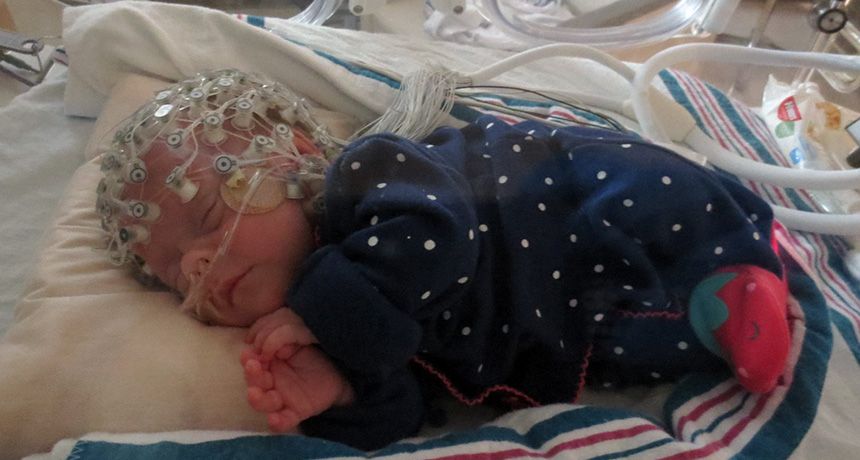Touches early in life may make a big impact on newborn babies’ brains

Many babies born early spend extra time in the hospital, receiving the care of dedicated teams of doctors and nurses. For these babies, the hospital is their first home. And early experiences there, from lights to sounds to touches, may influence how babies develop.
Touches early in life in the NICU, both pleasant and not, may shape how a baby’s brain responds to gentle touches later, a new study suggests. The results, published online March 16 in Current Biology, draw attention to the importance of touch, both in type and number.
Young babies can’t see that well. But the sense of touch develops early, making it a prime way to get messages to fuzzy-eyed, pre-verbal babies. “We focused on touch because it really is some of the basis for communication between parents and child,” says study coauthor Nathalie Maitre, a neonatologist and neuroscientist at Nationwide Children’s Hospital in Columbus, Ohio.
Maitre and her colleagues studied how babies’ brains responded to a light puff of air on the palms of their hands — a “very gentle and very weak touch,” she says. They measured these responses by putting adorable, tiny electroencephalogram, or EEG, caps on the babies.
The researchers puffed babies’ hands shortly before they were sent home. Sixty-one of the babies were born early, from 24 to 36 weeks gestation. At the time of the puff experiment, they had already spent a median of 28 days in the hospital. Another group of 55 babies, born full-term, was tested in the three days after birth.
Full-term babies had a strong brain reaction to the hand puff. (This reaction was missing when researchers pointed the air nozzle away from the babies, a control that ruled out the effects of the puff’s sound.) Preterm babies had weaker brain reactions to the hand puff, the researchers found.
But the story doesn’t stop there. The researchers also looked at the number and type of touches — positive or negative — the preemies received while in the hospital.
Preemies who received a greater number of positive early touches, such as breastfeeding, skin-to-skin cuddles and massage, had stronger brain responses to the puffs than preemies who received fewer. More worryingly, preemies who had a greater number of negative touch experiences, including heel pricks, IV insertions, injections and tape removal, tended to have diminished brain responses to the puffs.
About a third of the premature babies in the study didn’t receive any positive touches that the researchers counted. Between birth and the time of the hand-puff experiment, the median number of positive touch experiences for the preemies in the study was 4. In contrast, the median number of painful procedures was 32.
The study turns up links, not cause. That means scientists can’t say whether the early touches, both positive and negative, are behind the differences in brain response. But it’s possible that early tactile experiences pattern the brain in important ways, Maitre says. If so, then the results have big implications.
Oftentimes, parents don’t have the luxury of snuggling their baby, particularly when parental leave is limited and babies are being treated far from home. Nurses, doctors and other medical professionals provide other forms of care. But anything parents, medical professionals or even volunteer cuddlers can do to shift the balance of positive and negative touches might encourage babies’ development, giving these smallest and newest of people the best start possible.